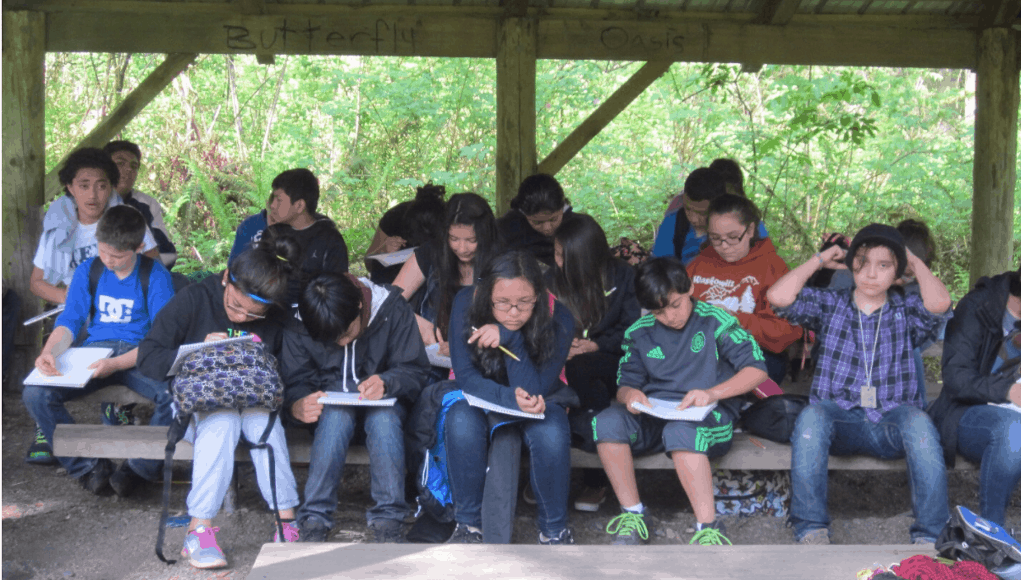Learning Leadership Skills Outdoors: Place-Based Ed in the Puget Sound

By Roberta McFarland
“Mountains to Sound” is a phrase that describes the Waskowitz Environmental Leadership & Service program in Washington state’s Highline School District. That’s because high school students start their first year learning in the forest, then the second on the waters of Puget Sound.
All the while, they are learning leadership skills in an active way, starting as freshmen by mentoring sixth-graders and finishing as seniors by developing outdoor leadership skills.
What do students have by the time they finish? Lots of place-based learning experiences to help them choose their next steps, which are often toward teaching, outdoor recreation, marine technology, ecotourism or environmental science.

An Outdoor Alternative to the “Typical” Alternative Education Experience
Waskowitz Environmental Leadership & Service (WELS) is a program for students who stand to benefit the most from the use of an active curriculum, a smaller more supportive learning community, alternative learning formats and a new peer group.
The three-year-old program is the core of Puget Sound High School. Students need to have the interest and ability to participate in a program that includes rigorous outdoor education, five weeks of time away from home during the school year and opportunities to mentor younger students.
In their first year, students learn in a project-based, relationship-centered, interdisciplinary environment and serve as leaders for Highline’s residential outdoor environmental education program. Highline’s sixth-grade students all have a week-long outdoor education experience at the district’s Waskowitz Outdoor School, a camp in North Bend, WA.
All WELS students also take seven courses that are part of the program’s Career & Technical Education (CTE) curriculum: Financial Algebra, Natural Resources /AP Environmental Science, PE, Intro to Humanities / Empowerment and Reading, Teaching Academy and Personal Choices.

Junior year, the program centers on the Puget Sound Skills Center‘s marine tech program. WELS students earn credits in marine biology and marine technology through experiential learning at the Center, which is based at the City of Burien’s Seahurst Park. The other half of the day, juniors take courses in U.S. history, geometry, psychology and leadership.
Seniors participate in an individualized program, Vocational Instruction Through Applied Learning (VITAL), to help them gain any missing credits necessary for graduation. In the afternoon, seniors focus on outdoor recreation leadership classes and work-based learning. WELS offers opportunities to earn dual credit at many local colleges and recently began a new partnership with Western Washington University.
Social-Emotional and Experiential Learning
Core elements of the WELS program are:
- Authentic leadership experience
- A rich curriculum full of Career & Technical Education (CTE) coursework
- Experiential education
A critical part of the program’s success is attention to students’ social-emotional learning through community-building. The program takes a student-centered approach, supporting each student’s development by providing active educational opportunities that support different ways of learning.
WELS students often find that school is suddenly a place where they want to be because others trust and rely on them. Students learn that school experiences can help them take steps toward reaching their goals.
This blog is part of our “Place-Based Education” blog series. To learn more and contribute a guest post for the series, check out the PBE campaign page. Join in the conversation on social media using #PlaceBasedEd. For more on Place-Based Education see:
- 5 Levels of Place-Based Learning Implementation
- Getting Smart Podcast | Experiencing Place-Based Education at Teton Science Schools
- 6 Starting Points for Place-Based Learning
Roberta McFarland is director of Waskowitz Environmental Leadership and Service program in the Highline School District. Follow them on Twitter: @HighlineSchools
Stay in-the-know with all things EdTech and innovations in learning by signing up to receive the weekly Smart Update.






0 Comments
Leave a Comment
Your email address will not be published. All fields are required.